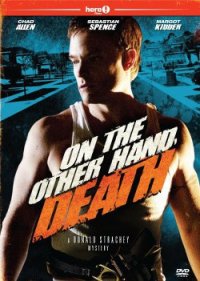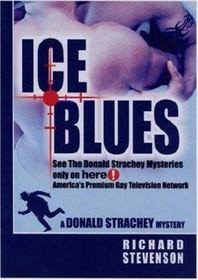Strachey's Folly - Stevenson Richard (читать книги онлайн регистрации .TXT) 📗
" 'Hey, Manes, if all this sounds just too, too ominous— well, believe me, it is.'
"Signed, 'Your friend Jim, still unlucky in love.'"
Timmy laid the letter on the dining room table and said, "Wow."
"Lurid, isn't it?" Maynard said, attempting jocularity, though he shifted in his seat like a man unnerved.
"Could Suter be making it all up?" Timmy asked. "You said he was unprincipled in a lot of ways. Maybe he's trying to manipulate you or manipulate events back here somehow."
"Jim's cynical," Maynard said, "about his own life and about the human race in general. But I've never heard of him jerking friends around in a devious way. If anything, he's known for his brutal honesty. That's why I guess I think I have to take what he's saying seriously."
Timmy said, "Nice guy, this Suter. By writing to you like this, now he's got you involved in whatever he's mixed up in. By warning you of the danger, he puts you in more danger. Now you've got this dangerous knowledge of some kind of plot. You don't know enough of the specifics to really protect yourself. This letter both helps you and increases your vulnerability. Suter sounds like an extremely complicated kind of friend to have."
Maynard blinked a couple of times, as if he didn't want to dwell on that. He said, "Maybe now we know why somebody put a panel for Jim in the quilt. It was meant as a threat or warning to him. Or," he went on, looking apprehensive, "maybe the panel was a threat or warning to other people who know Jim and who know what somebody thinks he knows, or who are thought to know what somebody thinks Jim knows."
"That part of the letter is murky," Timmy said. "About how somebody thinks Jim knows something that could send some big enchiladas to prison."
"What's murky about it?" Maynard asked. "It seems clear enough to me."
"But it sounds as if it's murky even to Jim," Timmy said. "If somebody thinks Jim knows something incriminating, why can't Jim simply tell these people he doesn't actually know what they think he knows?"
"Because," Maynard said, "maybe he doesn't know who 'they' are. 'They' are threatening and warning him—apparently they've made actual threats on his life—without ever identifying themselves."
"But if 'they' think Jim knows they did something criminal, then why would 'they' not identify themselves when they communicated their threats and warnings to Jim?"
I said, "Is the fatiguingly abstract tenor of this discussion typical of the conversations you guys had in the Peace Corps in India? It must have been exhausting. For you and for India."
"No," Maynard said, "our conversations back then tended to be more descriptive than analytical. We talked a lot about (a) poultry-debeaking techniques and (b) the peculiar qualities of our bowel movements."
"Of course, the latter is still true in your case," Timmy said, and he and Maynard both enjoyed a hearty guffaw over that.
One of the odder aspects of being the spouse—or "spouse-figure," as Timmy described me in his employment forms at the New York State Assembly—of a former Peace Corps volunteer was having to listen occasionally to these people converse not about the complexities of development in the third world—although they sometimes did that, too—but nearly as often, it sometimes seemed, about their memories of their exotic stools. When JFK spoke of tens of thousands of Peace Corps men and women bringing back their relatively sophisticated views of Africa, Asia, and Latin America to enrich our nation, could this have been what he had in mind?
Timmy suddenly said, "Hey, look, it's the quilt," and reached over and turned up the volume on the television set.
There it was, this gorgeous, heart-swelling mosaic of lost lives—lost but well-remembered—spread across acre upon grassy acre of some of Washington's most historic open space. These were the lawns where the Bonus Army had encamped, the hunger marchers had been ignored by Herbert Hoover, Marian Anderson had sung, Martin Luther King had had a dream. The television coverage of the AIDS quilt opened with some voice-over statistics and a slow, panning shot from the air. Then a Names Project volunteer was interviewed, as were several men, women, and children who had come to see the panels they had sewn for people they loved and who were gone. Finally there were sound bites from some sympathetic strangers, people who simply found this great monument to loss beautiful and moving.
Back in the studio, the news anchor concluded the quilt report by saying, "Today's display was also marred by a mysterious act of vandalism. Late this afternoon, just before the quilt panels were folded up for overnight storage, two men ripped a section off of one panel. The men escaped before security personnel could intervene. Typed pages coming out of the picture of a typewriter were taken from a quilt panel memorializing Jim Suter, of Washington. Police would not speculate on a motive for the vandalism. But a Names Project official said that earlier in the day questions had been raised about the Suter panel and the display organizers planned to investigate." The news reader had been somber, but now he looked instantly delighted, as if he were deranged, and said, "Today's balmy weather should con-linue, according to Flavius, and after a short break . . ."
Timmy turned down the TV sound and we all looked at each other.
Maynard's brown eyes were shining and he said, "Betty Krumfutz!"
"If the only parts of the quilt that the vandals took were the typed pages from the Krumfutz campaign bio," I said, "there does seem to be a connection to Mrs. Krumfutz's hurried, discreet appearance at Suter's panel."
"Hurried, not to say panicked," Timmy said. "That woman was in a complete state."
I asked Maynard, "Did you read what was on the pages? They were slugged 'Suter/Krumfutz,' but are you sure that what was actually typed on them was Jim's Krumfutz campaign bio?"
"That's what it looked like. I saw some stuff there about Betty's antiabortion record in the Pennsylvania legislature. And another page had a paragraph on school prayer and getting patriotism back into history textbooks. I didn't read any of it with care. It just looked like standard religious-right boilerplate. But the pages I saw seemed to be exactly what the page slugs said they were, Jim's Krumfutz campaign bio."
"I'm surprised," I said, "that that stuff doesn't move directly from the printer to the recycling bins. But I guess it must have some effect, or politicians wouldn't spend their campaign millions on it."
"A small percentage of voters—usually the slower, more gullible folks—actually read campaign handouts as if they were as imperishable as Alexander Hamilton," Maynard said. "And often all it takes to swing an election is one or two percent of the vote. So it's not a waste of money when a candidate churns that stuff out."
"But," I said, "there must have been something on those sheets of typescript on the quilt panel that somebody badly wanted to keep out of public view. And when I looked at the pages, I saw what you both saw, and there was nothing remarkable about any of it on the surface. Maybe there was something revealing on the backs of the pages—although it's hard to imagine why anyone would be afraid of any words or pictures that weren't visible." I asked Maynard, "Did Jim Suter actually use a typewriter, and not a word processor or computer?"




